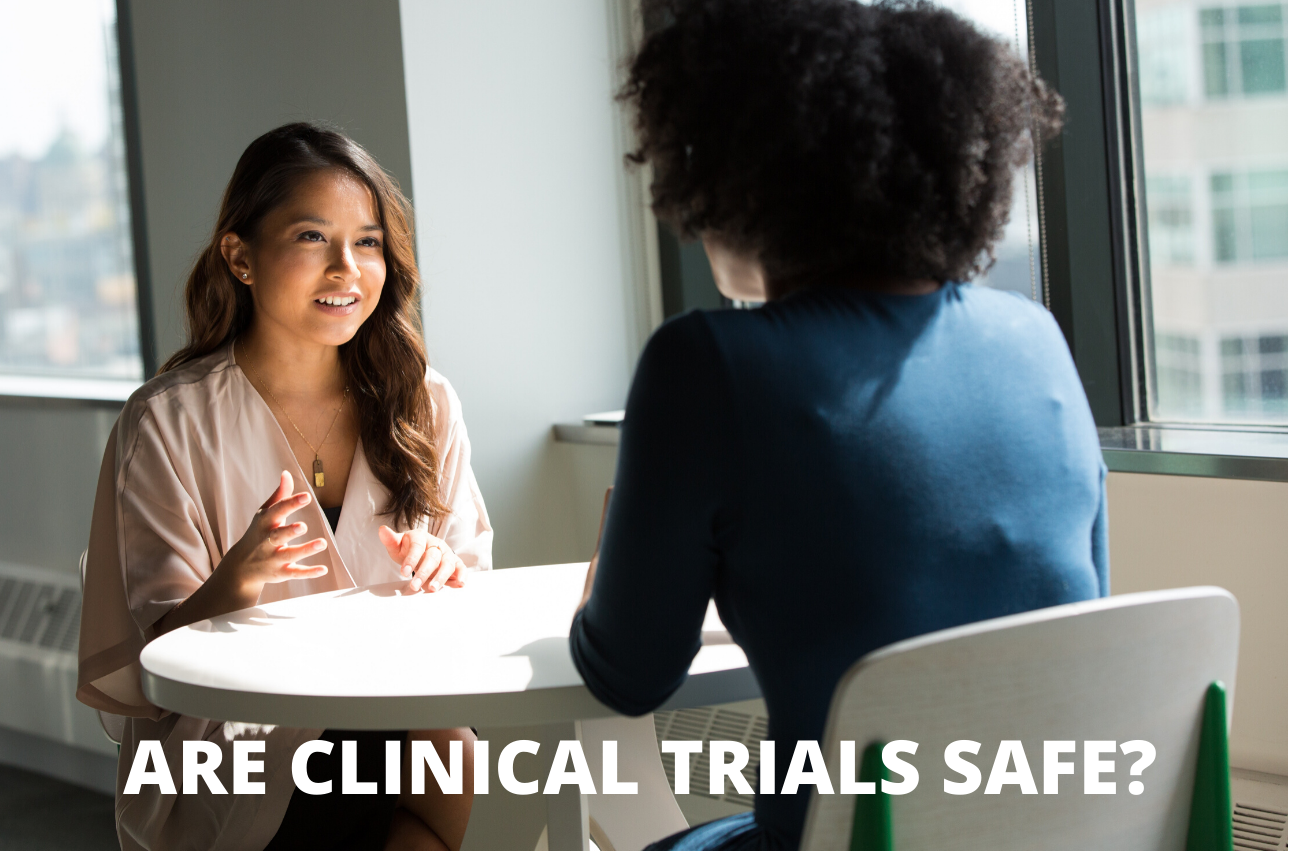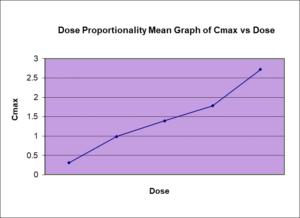Are clinical trials safe ?
Clinical trials performed on humans are the cornerstone of modern-day drug development processes and all drugs go through a series of stringent tests before they make their way to the pharmacy shelves. All steps taken in the process are well- defined and monitored by the Food and Drug Administration (FDA), Health Canada, and major regulatory bodies across the world.
Over the years, Canadian Contract Research Organizations (CROs) have tested hundreds of drugs on humans successfully and various safety measures have been put in place over time as medical science has made progress. However, clinical trials are often presumed to be risky and even life threatening by many. Let’s discuss the steps briefly before we talk about the risks. Before deciding to volunteer for a clinical trial, it’s always helpful to have a brief overview of the processes involved.

Clinical Trial Phases
The drug development process involves testing in various phases. Each phase is designed to achieve specific results that assist in the overall development of the drug.
Phase I: The first phase of testing involves dosing a small group of healthy volunteers. The first group of people are administered with low doses of the drug and are monitored closely. The amount of dosage is increased for the next group of volunteers if no/minor side effects are noticed. The process ultimately answers the following questions:
- Is the drug safe on humans?
- What is the safe range for dosage?
- Are there any side affects?
Once the above-mentioned questions are answered, researchers move to the next phase of research. Typically, over 70 per cent of drugs are approved by the FDA for further research.
Phase II: Research at this stage involves administering the new drug to a large group of people (100 or more). Researchers test the effectiveness of the drug on patients with the disease or condition for which the drug is being developed. This step is designed to obtain preliminary data on effectiveness, dosage and safety of the drug. The data collected is used to develop research methods and design new protocols for the next stage. Typically, over 33 per cent of drugs pass Phase II research and move on to the third stage.
Phase III: The first two phases of research answer preliminary questions related to the dosage and safety of the drug, among others. In Phase III research, scientists test the effectiveness of the drug on 300 to 3,000 volunteers who have the disease or condition. This phase helps scientists figure out if the drug offers treatment benefits and if there are any side effects that may have gone undetected in the previous stages. Since these studies are conducted over a span of 1-4 years, it allows scientists to study the long-term or rare side effects before moving to the next stage. According to the FDA, approximately 25-30 per cent of drugs to move to the fourth stage of research.
Phase IV: In both USA and Canada, Phase IV trials are carried out once the drug has been approved and is on the market. Researchers collect information on the best way to use the drug, long-term benefits and risks, etc. These studies are carried out on several thousand volunteers who have the particular disease or condition the drug has been developed for.
Now that we are aware of the four different phases of clinical trial, it’s also important to assess the risks associated in the trials.
The Government of Canada has laid out stringent measures to ensure Canadians have access to safe and effective drugs. Health Canada reviews clinical trial applications while ensuring safety tests are in place to reduce possibilities of side effects in volunteers. This regulatory body also visits research sites, such as our sites at BioPharma Services Inc., to make sure volunteers are taken care of and trials are conducted as per set guidelines. Not just Health Canada, our research facilities in both Canada and the US have been inspected and certified by the FDA, UK Medicines and Healthcare Products Regulatory Agency (MHRA), World Health Organization, French National Agency for Medicines and Health Products Safety (ANSM), among others.
Similarly, in the US, the FDA works closely with research organizations to protect volunteers in clinical trials and ensure they have reliable information before deciding whether to take part. Further regulations and guidelines are in place to protect volunteers from any risks. To ensure safety of volunteers, every research facility is required to provide an informed consent document that describes your rights as a participant, as well as details about the study, including potential risks.
Despite regulations in place, many still feel a clinical trial may be risky, as it may lead to short term or long-term side effects, while of course taking your personal time for hospital stays and lab visits. It’s worth noting here that you have the absolute right to pull out of a study at your own discretion, at any point, and you’ll be safely taken off the medication administered.
If you have agreed to participate in a clinical trial, you will need to follow safety precautions including but not limited to:
- Taking medication as instructed by our doctors
- Attend all scheduled visits
- Report any side effects and symptoms right away to the doctor
Overall, not only do the benefits of volunteering for clinical trials outweigh the possible risks, but participation is the cornerstone of medical research. Fortunately, populations in North America see strong participation in all phases of clinical trials which is one of the reasons why the region leads medicinal research globally. Here at BioPharma, we take great pride in helping advance the world while keeping safety as our highest priority.
BioPharma Services Inc. is a contract research organization that conducts research studies across all medical disciplines. Our offices and study sites are located in Toronto, Ontario and Columbia, Missouri. For our current research studies visit our volunteer hub today.
Popular Posts
-
What are early phase clinical trials?
Clinical Trials are divided into 4 phases. Phase 1 and 2 trials constitute early phase trials, Phase 3 and 4 research studies are late-phase trials.
The primary objective of Phase 1 studies is to determine the correct drug dosage by evaluating drug safety and determining if there are any side effects. Phase 1 trials are conducted in healthy volunteers.
Phase 2 studies also study the safety of a drug but focus on evaluating its effectiveness. These studies can be conducted in healthy volunteers or in individuals who have a certain disease or condition.
-
What is a clinical trial?
A Clinical trial is a process which is performed to determine whether an investigational drug, device or therapy is safe and effective. In early phase research (i.e. Phases 1 and 2), the safety and effectiveness of the drug will be evaluated in healthy volunteers.
-
What is an investigational drug?
An investigational drug can also be called an experimental drug and is being studied to see if your disease or medical condition improves while taking it. Scientists are trying to prove in clinical trials:
- If the drug is safe and effective.
- How the drug might be used in that disease.
- How much of the drug is needed.
- Information about the potential benefits and risks of taking the drug.
-
Why do you need to take blood draws and how many blood draws will be required?
In order to evaluate the drug profile, we need to understand its pharmacokinetics. This is essentially how the body reacts to a drug after its administration through the mechanisms of absorption, distribution, as well as the metabolic changes. Therefore, blood draws are collected at various time points to better understand this mechanism. Each study requires a specific number of blood draws and total blood volume. These values will be provided to you and clearly stipulated in the informed consent form (ICF). The amount of blood that will be taken is outlined in the ICF.
-
Should I expect to experience any side-effects while doing studies?
As every study is testing an investigational product, there may be side effects. You will be provided with a list of side effects that have been reported in previous trials (if any), so you can make an informed decision whether or not to participate in the trial. During the trial you will be required to immediately inform clinic study staff of any adverse effects that you are experiencing. These side effects usually resolve upon discontinuation of the study drug.
-
Will I be compensated for doing a clinical study?
Volunteers are compensated and the amount varies depending on the length of the clinical trial, length of stay and number of follow-up visits. The compensation is not specifically related to the risks or type of drug involved in the trials or studies. Every study is different and therefore, the compensation will vary. Study volunteers may receive between $1000 to $4000 for a trial (based on the factors listed above).
-
Are food and accommodation provided over the course of the trial?
Food – Clinical trials are conducted in a controlled setting which means that all food is provided and trial volunteers receive standardised meals. Individual meal plans or meal preferences cannot be provided. If you have any food allergies or hypersensitivity to food product(s) that are clinically significant or life-threatening you may not be able to participate in a trial. Please contact us to discuss any food issues.
Accommodation – During your in-clinic stay you will share sleeping areas with other volunteers who are of the same gender. Similar to a hospital setting, supervision will be provided to ensure that your health and safety are being monitored.
-
What is the length of a study and do I have to complete all the visits?
Details of the duration of a study can be found on the Volunteer Hub.
-
What is informed consent and how is it carried out?
Before you decide whether or not to take part in a clinical research study, you will be required to read and understand the information provided in an Informed Consent Form (ICF). The ICF describes the clinical research study and the nature of the investigational product to be used, including:
- Your rights and responsibilities as a study participant.
- What you will be asked to do during study participation.
- The potential risks that you should be aware of.
During this process, you will have the opportunity to discuss and ask questions related to the conduct of the clinical research study with the study doctor/ study staff. You are under no obligation to participate and your decision to take part in a clinical trial is voluntary.
-
Can I bring my own device?
Yes, we encourage you to bring items that will help to pass the time while you are in the clinic. You can use the time to study or work or catch up on the movies you’ve been meaning to watch.
-
What do I need to pack?
Wondering what to pack before your site visit? Visit our Packing List page to learn more.
-
When do I receive compensation for taking part in a study?
You will receive compensation as outlined during the Informed Consent process. Typically, you will receive compensation once all study visits have been completed. If, for any reason, you do not complete all study visits, your compensation will be on a pro-rated basis (i.e. for the time that you have participated in the trial)
-
Where will I sleep during the clinical study?
We provide a clean, safe socially distance sleeping environment, in a dormitory of hotel room style. Watch video
-
Can I bring my own food?
All aspects of clinical trials are closely monitored including the food and drink consumed by participants. While you are in the clinic, you will be provided with all meals as per the study guidelines. You will need to eat all the food provided to ensure the guidelines are met. Watch video
-
Privacy
We respect and value the privacy of our volunteers. View our Privacy and Cookie Policy here.



